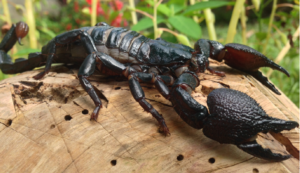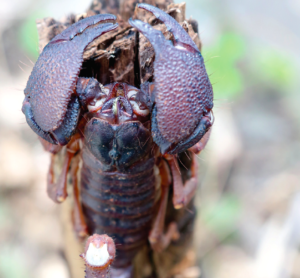Find out more about this scorpion species popular with exotic pet-lovers.
Scorpions have long fascinated people, beginning with the ancient Egyptians, whose goddess Serket―who healed venomous stings and bites―was represented by a scorpion. The Scorpio zodiac sign, also symbolized by a scorpion, is considered secretive, sexy, and the kind to hold grudges. While popular culture tends to associate scorpions with darkness and treachery, many who keep and love scorpions will disagree―and for good reason.

Keepers of Extreme Exotic Philippines member Vixvy Panugayan shared his experience and knowledge about this fascinating creature with Animal Scene and its readers. When asked why, despite the swammerdami’s intimidating looks, it is a popular scorpion species―indeed, there is much interest in, and fascination with it, online―he cites the hype surrounding it as one of the largest scorpions in the world as one of the reasons. It is said to be able to reach 12 inches in length but Panugayan says the largest he’s seen was 8 inches in length. Still, only a handful of other species can match the swammerdami in size, such as Hadogenes sps, Parabuthus sps, and Pandinus sps.

Not for Bragging Rights Alone
The ownership of a swammerdami earns a scorpion fancier bragging rights; Panugayan compares it to owning a Goliath Birdeater (Theraphosa blondi) if you’re into spiders or tarantulas―it’s considered a must to have one. However, he cautions people against buying a swammerdami just to brag or show off. “They are still considered wild animals, and their sting can pack a punch. It is still recommended that people who plan to keep this kind of animal follow the rule of thumb, ‘small claws/pincers are more potent that bulky ones’. But if you want them as pets then treat them like the fish in your aquarium, which are for your eyes only.” Once you understand that, he says, “they are very lovely and wonderful pets.”

Also, while the swammerdami is a typical rainforest scorpion, it can be hard to breed, explains Panugayan. To say a scorpion is poisonous is misleading, he says. “Poisons are ingested and venoms are injected; that is the difference.” Calling scorpions ‘venomous’ can be chilling, he adds, “…but according to studies, most stings aren’t deadly unless your body reacts to venom,” meaning, you have an allergic reaction. As an aside, Panugayan explains how overreactions to scorpion stings can also be deadly, especially when victims of stings describe imaginary symptoms to grab headlines―which sometimes means they do not get the proper treatment.
He says he’s had to educate tribesmen about misconceptions, such as the one about scorpion stings killing a carabao. “They are not deadly if respected and left alone; they help control pests like cockroach and termite infestations. They are your just your typical bee upsized,” Panugayan says. “Even a swarm of bees can kill but [for the most part] a single sting won’t; they are even believed to [help cure] some ailments.”

Practical Advice
What can he say to someone who is interested in keeping a swammerdami for a pet? What are the things these people need to consider before taking the plunge? Who would the swammerdami make ideal pets for? “They say it’s cool to be different but you also have to be responsible,” he says. “If they want to keep [the swammerdami] as a trophy, I say, better not keep them anymore.” Panugayan points out that caring for a swammerdami is an obligation and responsibility, just as owning a dog or another pet is. “If your dog bit someone, you are responsible for what happens to your dog’s victim,” he adds to emphasize the point.

What about new owners; does Panugayan have any tips for taking care of swammerdami? In addition to being fully committed to caring for the scorpion, he says, the new owner needs to know the basics, such as the kind of climate a swammerdami requires, and to provide them for his or her new pet. These include an amply spaced enclosure, provisions for food, and moisture requirements. “There are three kinds of scorpions: desert, rainforest, and arid―but they all still need to drink,” he points out. What are the top misconceptions about scorpions people have that he would like to change? Panugayan laughs and enumerates, “Scorpions cannot kill a bovine. Their stings do not cause impotence, and there is nothing beneficial in eating scorpions. Finally, scorpions are insectivores, not herbivores.”
Photos by Jeffrey C. Lim
This appeared in Animal Scene’s January 2016 issue.






